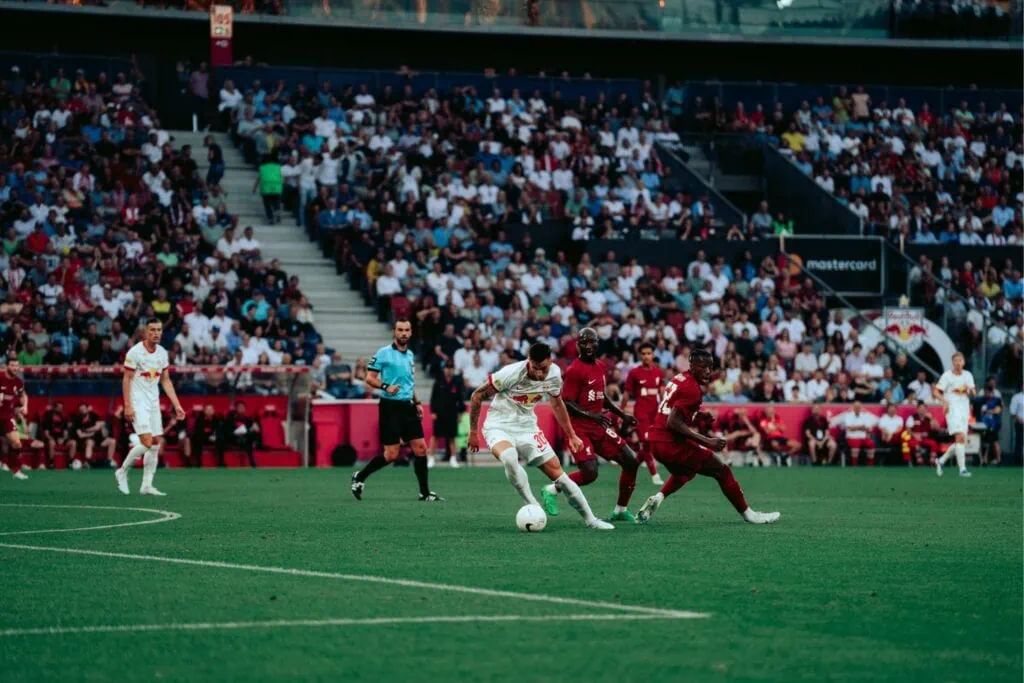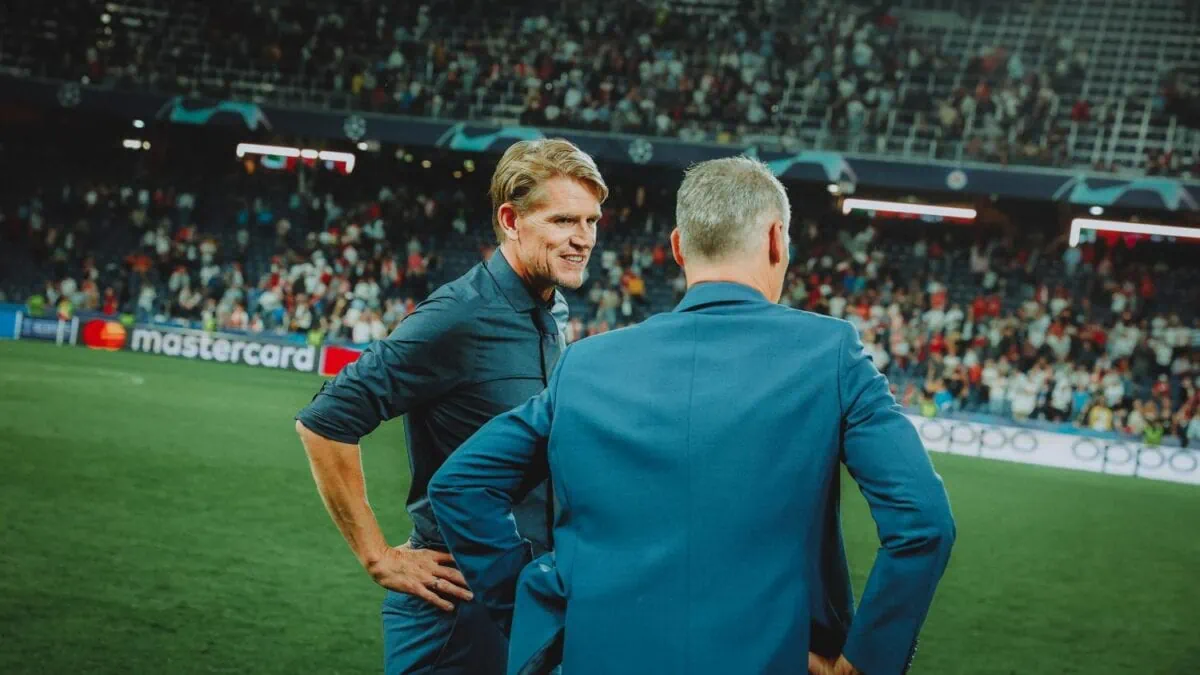Im dritten und letzten Teil erzählt Anna, wie sich Christophs Freund erfolgreicher Weg in der Branche herumgesprochen und Begehrlichkeiten geweckt hat und wie es mit Salzburg ohne ihn weitergehen könnte…
Hast du den ersten und zweiten Teil der Serie gelesen? Nein? Dann hier entlang:
Making a name in the Champions League for oneself
Overcoming the curse of the Champions League took 11 attempts, some of which were abhorrent and shameful (like Dudelange and potentially also Rijeka, although to a lesser extent), and some were genuinely heartbreaking (extra time in the second attempt with Malmö FF, or those two goals conceded in slightly more than a minute from Red Star Belgrade at home). However, Salzburg lifted the curse on their own merit: gaining enough coefficient points for Austria through successful performances in the Europa League and, most notably, the 2018 semifinals, where an incorrectly awarded corner resulted in the decisive goal in the last minutes of extra time, denying Salzburg the potential chance to advance to the final. There it was, the direct ticket to the Champions League group stage in 2019. The dream was fulfilled.
“Twenty years ago, when I was in Monaco for the last time, at the Formula 1 Grand Prix, my friends and I slept on the beach for a few days and brushed our teeth on the street. And now, we are here, in a hotel room with a view of yachts,” Christoph Freund recalled with a smile during his first Champions League draw in 2019, as it’s shown in the Jeder.Mann documentary series (watch with English subtitles here). Indeed, much has changed since then, and much has changed for the club in the past couple of decades. During Christoph Freund’s reign, Red Bull Salzburg has gone the whole way from experiencing foolish defeats against weaker opponents in the ominous UCL qualification to having memorable days like the 6:2 win against Gent in the debut UCL match, heroic moments at Anfield, or making it to the playoffs in the 2021/22 season with a squad with an average age of just 22,07 years.
Today, Salzburg is a regular Champions League participant who is about to start its journey this season from the third pot. The club has significantly improved its reputation on the international stage, and now many in-demand young talents choose moves to Austria with a clear plan for their own development over uncertain prospects on the benches of the likes of Barcelona or any of the Manchester clubs. This transformation has also improved the reputation of the entire league, once considered a provincial championship where nothing interesting happened. Now, transfers to decent clubs happen to Sturm, sometimes Rapid, and even smaller clubs like Wolfsberg. While it’s clear that no one can compete with Salzburg domestically in the long run due to the enormous financial gap between them and the rest, the overall level of the championship has noticeably risen. Other clubs, according to their capabilities, have started to imitate the eternal champion and introduce elements of the Salzburg plan into their concepts.
Fans have fallen in love with the club again
As a result of the comprehensive approach and the success of recent years on the international level, the club’s somewhat colder relationship with the fans has started to improve. During Freund’s era the average domestic attendance has grown from 5,000 to 11-12,000. Most international matches sell out at 30,000 fans, and on the fan stand, not only the traditional red-white colors but also purple, which was actively opposed in the early days, can now be seen occasionally. It is said behind the curtain that not only the CEO Stephan Reiter, but also Christoph Freund had a hand in reconciling with the club’s history, old colors, and the founding date of 1933 that was attempted to be erased in the early Red Bull days. It reminds of the Ship of Theseus paradox: if each individual part of the ship was replaced, one at a time, was it still the same ship? It seems like Freund has an answer to this question for himself, and not necessarily the one that the public opinion wants and expects.
Making an international impression

Naturally, such impeccable systematic work could not go unnoticed, and European clubs have been knocking on Freund’s door for years. Initially, it was clubs like Eintracht and Schalke, but with time, top clubs started showing interest in him. Last autumn, he nearly ended up at Chelsea as part of Todd Bowley’s grab-and-go campaign (and now he should probably thank the destiny for dodging the pleasure of participating in that circus performance). Throughout the years, he consistently maintained a stance: he would not find better working conditions anywhere else in the world, where he can absolute freedom to do what he deems necessary, without reporting to anyone, all while living in his beloved city and going to work on a bicycle. However, the current moment seems like a logical time for Christoph Freund to finally go separate ways with the main project of his life.
Salzburg’s past season left a mixed impression. On one hand, all the main mechanisms worked flawlessly: the talent factory kept working, the gears were spinning as usual, new stars were emerging, even despite a rather underwhelming generation at Liefering (remember one name for the next season: Karim Konate). On the other hand, Matthias Jaissle struggled throughout the year with the second-season syndrome, mishandled the winter preparations, and revamped the tactics for the spring part, resulting in Salzburg displaying an unusually lackluster football by their standards, lacking intensity and compounded by external factors like a series of injuries (read more about it here: Highs, lows, and a lot of unanswered questions: FC Red Bull Salzburg’s 2022/23 season in review). For the first time in five years, the club ended the season with only one domestic title, losing the cup to “Sturm.” Nevertheless, Jaissle retained his position, and instead of significant upheavals in the squad, only minor changes can be observed so far. The combination of excessive stability in the system and operational stagnation is undoubtedly not the best environment for people as committed and emotionally attached to their work as Christoph Freund.
Answering the Bayern call
Therefore, this summer marked the “now or never” moment for him: Bayern Munich’s offer appears much more fitting and promising than Chelsea’s and all previous ones. The anticipated processes at Bayern would allow him to try adapting his familiar schemes to one of the biggest clubs on the planet, and Munich is just a little over an hour away from his hometown. It might be a bit too far for cycling, but it’s better than flying across half of Europe.
What can Christoph Freund bring to Bayern? Some might argue that his experience with only one club in his CV might not seem as convincing for a top team with world-class stars. However, Bayern is in dire need of systematization. What is mandatory now is systematic planning of the first-team squad, where blatant gaps and questionable decisions could have been observed in recent years, systematic work with the academy, neglected for years despite exceptions like Josip Stanisic who made it to the first team, and systematic development of international relationships, where Bayern clearly intends to work more within the region and at the same time seeks distant geographic partnerships (example: the recent agreement with Los Angeles FC). And systematization is precisely what Freund can offer to Bayern.
Moreover, he will be surrounded by people who share his approach and philosophy. Thomas Tuchel has never been part of the Red Bull world, but much of his ideas and behavior patterns resonate with the principles of the football department of the corporation. The club’s campus has been under the management of Freund’s former boss, Jochen Sauer, for six years now (his fate was also uncertain until recently, but with the current personnel decision, his contract extension is not a surprise), so any changes in the work of the youth system will be received with enthusiasm. So, if he manages to avoid the oh-so-sual hindrances from the top management and their countless advisers at Bayern (a problem that is hard to avoid for any truly big club), the fruits of his work might be visible quite soon.
And if these arguments are not enough, it’s worth mentioning that in Christoph Freund, Bayern will get a splendid master of team celebrations (and, in general, a boss who is extremely fond of warm and friendly relationships with his subordinates). The number of trophies won by Salzburg under his helm has exceeded all reasonable limits, but none of them has been dissected into memes about the sour expressions on the faces of players tired of winning, as it often happened with Bayern. When your sporting director is a rock star, party animal, and the biggest fan of the team who still remembers his past on the fan stands, every celebration becomes three times better. Well, with these prerequisites, should Bayern start preparing for a sextuple again?
Salzburgs future without Freund

And what about Salzburg in anno post Christoph Freund, the biggest figure in its modern history? Over the past years, he not only established an impeccable and robust system but also assembled a cohesive team that could handle any responsibilities with full confidence. Although his right-hand man, Johannes Jahns, also left the club this summer, taking on the role at his hometown club Werder Bremen, there are a few other individuals who are ready to step up.
The decision was made accordingly, despite reported attempts by the Red Bull headquarters, where Oliver Mintzlaff has been in charge of the global sports strategy for several months now, to intervene and push for an “experienced external solution.” The club chose its own path instead. Bernhard Seonbuchner, a 40-year-old specialist who has been leading the club’s academy in recent years and has worked in various positions within the academy and Salzburg since 2010, has been appointed as Freund’s successor.
And this is the true legacy of Christoph Freund’s era, who, together with Stephan Reiter, transformed the club from an almost abandoned satellite-like entity into a project that stands on its own and follows its path. Salzburg will continue to work according to the plans and technical drawings left by a carpenter from Leogang, who approached all projects in life with the same principles.

